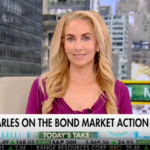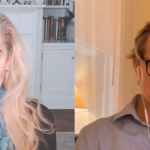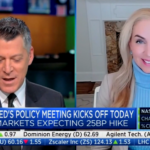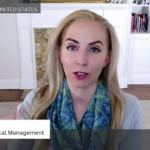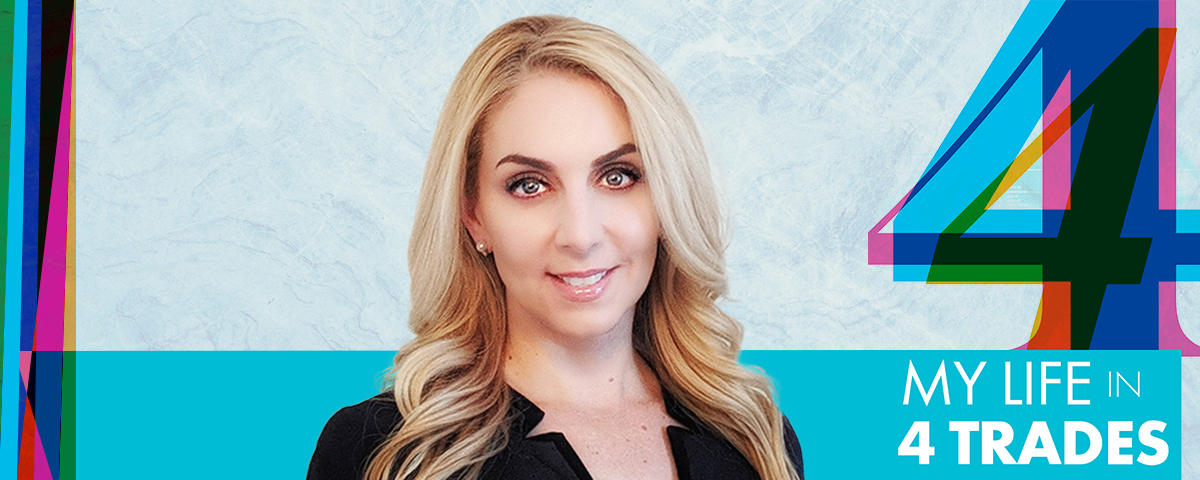
From Goldman to CIO: IVOL Portfolio Manager Nancy Davis’ Life in Four Trades
Nancy Davis of Quadratic Capital Management recently joined Maggie Lake’s “My Life in Four Trades” to discuss pivotal moments that guided her career path. After trading her Southern upbringing for a career in New York, Davis shared her experience navigating the European debt crisis, lessons learned from shorting Japan, and her research challenging gold as an inflation hedge. Davis leveraged all this experience in founding her firm, Quadratic Capital Management, in 2013, where she is currently the portfolio manager for the Quadratic Interest Rate Volatility and Inflation Hedge ETF (Ticker: IVOL).
Taking the Leap
Fresh out of college, Davis was fortunate to have multiple job offers from prominent firms. She sought advice making the decision from one of her professors, who was a former leveraged buyout banker. She took his recommendation to go with Goldman Sachs. Davis said that before today’s age of technology and information, “You could really listen to what people tell you, who were more experienced,” and that it may have been a more challenging decision in today’s environment with the overwhelming availability of information. Davis was grateful for her professor’s guidance and believes it helped get her to where she is today.
Reflecting on her interview process at Goldman Sachs, Davis acknowledged the stress and challenges it entailed. However, with her mathematical background and determination, she was brought on board. Davis admitted that, compared to her Ivy League-educated peers, she felt like somewhat of an “outlier.” Nevertheless, she remained focused and eager to prove herself in the competitive world of Wall Street.
During her time at Goldman Sachs, Davis was asked to work on the proprietary trading desk. She believed that Goldman's prop desk offered a focused trading environment, where traders invested the firm’s capital rather than executing client trades. In 2003, Davis achieved a significant milestone when she was promoted to Head of Credit, Over-the-Counter (OTC) and Derivatives Trading for the Goldman prop desk. She left Goldman Sachs after nearly a decade to serve as a portfolio manager at Highbridge, a subsidiary of JP Morgan, managing $500 million of capital in a derivatives-only portfolio.
Davis said her determination to “look for opportunities, attractive convexities, and things that might potentially be mispriced” helped her succeed over the long term in finance. She admitted that she has always “loved buying cheap options and being anti-consensus,” and her preference for asymmetric derivatives has formed her unique style for constructing portfolios.
The “Widowmaker”
The conversation then shifted to Davis’s experience with shorting Japan, which she prefaced by telling listeners that Japan had sometimes been referenced as the "widow maker" due to its challenging nature. Davis tried numerous ways to short Japan, like private equity, swaptions in the rates market, Japanese Yen/USD options, Nikkei, and dispersion trades. However, she found it one of her worst and most frustrating trades due to Japan's fundamentals and the country itself. The central bank's market manipulation, long-standing deflation, and unique yield curve control added to the difficulty. Despite the challenges, Davis admitted to being drawn to shorting Japan throughout her career.
Lake asked about Davis’s persistence in trying to short Japan, and she explained that the attraction lay in the “cheap volatility” present in the market. However, she acknowledged that Japan had been a tough trade to profit from, particularly in rates and equity markets, due to the central bank's interventions. Davis is currently focused on 1940 Act funds with very clear prospectuses which embrace the ETF tax efficiency in a single CUSIP strategy, and Japan has not been a part of their investment strategy. She did not express immediate plans to revisit shorting Japan but remains open to the possibility in the future.
Gold Deception
Davis discussed her experience with gold as a trade. She initially believed that gold would be a good hedge against inflation and had it in her portfolio beginning in 2009, following the financial crisis and the Fed implementing quantitative easing. However, she found that gold did not perform as expected and had become another frustrating trade. She tried different ways of constructing long gold positions, including owning gold in FX form against the Swiss franc, which made the metal a favorable carry position. But due to issues with the Swiss franc, the trade didn't work out as planned. Through academic research, Davis concluded that gold is more of “a fiat currency trade, an FX trade, and is psychology-driven rather than a reliable inflation hedge.”
Lake mentioned that gold is a popular topic among viewers who seek it as a safe haven, but Davis firmly believes that gold is not an inflation hedge.
Quadratic Capital Management
Davis discussed her decision to start Quadratic Capital and launch the Quadratic Interest Rate Volatility and Inflation Hedge ETF (Ticker: IVOL) in 2019. Davis shared that her motivation to start the firm came from a “life-long career passion to fix the TIPS (treasury inflation-protected securities) market.” At the start of her career at Goldman Sachs, she doubted the US Treasury Department’s decision to have the TIPS market utilize the consumer price index (CPI) Davis points out that CPI, “is not even an index that the Fed uses.”
Ultimately, Davis wanted to create a solution that combined TIPS with long options to provide better inflation protection. Davis believes the asset management industry needs more innovation, and she saw an opportunity to bring something different to the market. Davis talked about her challenges as an entrepreneur, particularly in the ETF industry, which is “really controlled by three large firms.” Davis explained that getting approved by wealth management platforms is a long process. Despite the challenges, Davis remains optimistic and determined to compete with the larger firms.
Conclusion
From taking a leap of faith into Wall Street's competitive realm to weathering the European debt crisis, Davis's experiences have shaped her unique trading style and risk management approach. Now, as the founder of Quadratic Capital Management, Davis’s Quadratic Interest Rate Volatility and Inflation Hedge ETF (Ticker: IVOL) is challenging the status quo and offering a new perspective in the asset management industry.
About IVOL
The Quadratic Interest Rate Volatility and Inflation Hedge ETF (Ticker: IVOL) is an inflation-protected bond fund that tries to fix the problems inherent in TIPS (Treasury Inflation Protected Securities). The three problems that IVOL seeks to solve are:
1. The only index of inflation used by TIPS is the Consumer Price Index (CPI). Even the Fed does not use CPI as its primary gauge for inflation. Roughly one third of the entire index is rent. IVOL provides investors another way potentially to profit from inflation that isn’t captured by the CPI index.
2. All TIPS are long duration. Even “short duration” TIPS are still long duration. This means that all TIPS fall in price when real interest rates move higher. IVOL seeks to solve this exposure and potentially to profit from higher long-date rates which cause the yield curve to steepen.
3. Inflation has no zero bound. Breakevens can fall well below zero. This can increase the risks of short duration TIPS because the shorter breakevens tend to fall much faster than longer term breakevens. IVOL seeks to mitigate the downside of TIPS alone through its portfolio of fully funded options which can potentially profit during “risk off” periods from rising volatility and lower-than-expected policy rates. TIPS themselves may struggle when equities sell off and credit spreads widen.
Additionally, IVOL has distributed a minimum of 30bps per month for almost four years.
For IVOL’s standard performance and 30 day SEC yield, please click here.
In 2022, all of IVOL’s monthly distributions were not taxable. This is because IVOL has a sophisticated tax treatment to potentially harvest negative ordinary income, which can be used to offset the interest income from the Treasuries.
Finally, the fund utilizes a passive TIPS index to access tax efficiencies of trading Treasuries in kind benefiting IVOL’s shareholders.

